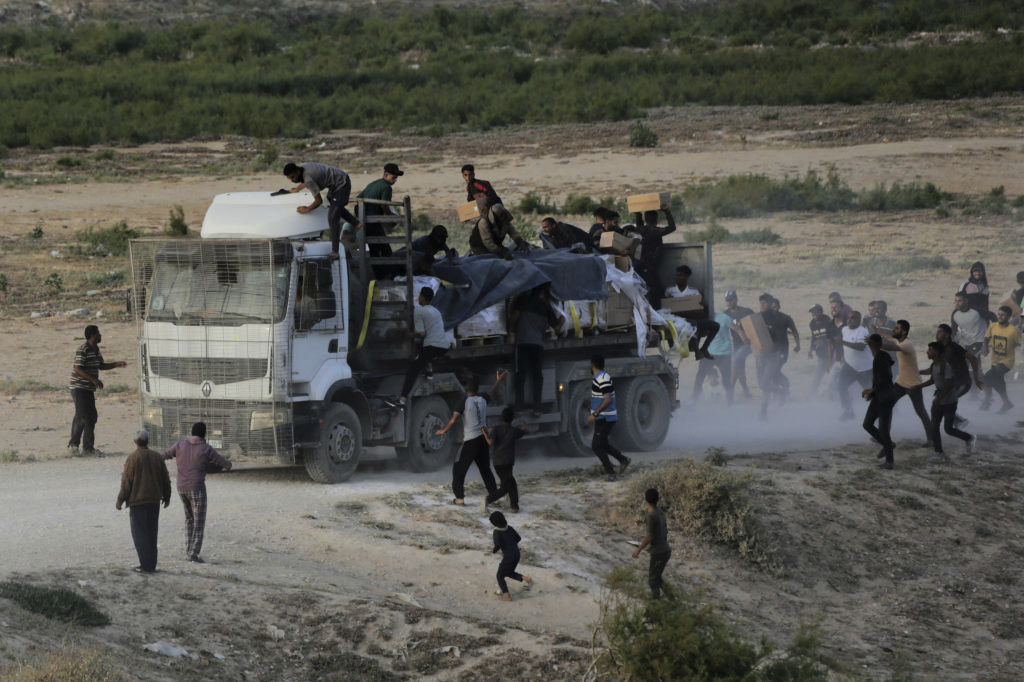Close to three-fourths of the humanitarian aid transported from a new floating pier built by the U.S. military off the Gaza coast was stolen on Saturday en route to a U.N. warehouse. Pictured: Palestinian men loot a truck carrying international humanitarian aid from the U.S.-built floating pier near Nuseirat in the Gaza Strip on May 18, 2024. (Photo by AFP via Getty Images)
Nearly 70% of Gaza Aid from U.S.-Built Pier Stolen
Close to three-fourths of the humanitarian aid transported from a new $320 million floating pier built by the U.S. military off the Gaza coast was stolen on Saturday en route to a U.N. warehouse, Reuters reported on Tuesday.
Eleven trucks “were cleaned out by Palestinians” on the journey to the World Food Programme warehouse in Deir El Balah in the central Strip, with only five truckloads making it to the destination.
“They’ve not seen trucks for a while,” a U.N. official told Reuters. “They just basically mounted on the trucks and helped themselves to some of the food parcels.”
According to the United Nations, no aid was delivered to the warehouse from the U.S. military’s pier on Sunday and Monday.
The United Nations said that 10 truckloads of food aid from the pier arrived at the warehouse on Friday, its first day of operation. It was transported by U.N. contractors.
“We need to make sure that the necessary security and logistical arrangements are in place before we proceed,” said the U.N. official.
According to Israeli estimates, Hamas has been stealing up to 60% of the aid entering the Gaza Strip, and a Channel 12 report last week revealed that the terrorist organization has made at least $500 million in profit off humanitarian aid since the start of the war on Oct. 7.
The pier was pre-assembled at the Israeli port of Ashdod before being anchored to a beach in the coastal enclave on Thursday. No American troops went ashore during the installation of the pier, according to U.S. Central Command (CENTCOM). Some 1,000 U.S. soldiers and sailors helped build the floating pier.
The Israel Defense Ministry’s Coordinator of Government Activities in the Territories (COGAT) unit announced on Saturday that “hundreds of pallets of humanitarian aid” and more than 160,000 liters of fuel had entered via the pier.
Vice Admiral Brad Cooper, deputy commander of CENTCOM, said that the goal is for 500 tons of humanitarian aid, or 90 trucks, to pass into Gaza through the pier daily, eventually increasing to 150 trucks a day.
CENTCOM tweeted early Tuesday that over 569 metric tons of humanitarian assistance has been unloaded from the pier so far.
Reuters is reporting that most of the aid coming into Gaza from the U.S. military’s pier since Saturday was stolen by Palestinians as it made its journey to the UN’s warehouse in nearby Deir El Balah.
* 11 trucks out of 16 trucks were cleaned out on Saturday
* No deliveries on…— Phil Stewart (@phildstewart) May 20, 2024
Reuters also reported that “food and medicine for Palestinians in Gaza are piling up in Egypt because the Rafah crossing remains closed.”
Israel took operational control of the crossing weeks ago, but Cairo so far has refused to cooperate with Israeli authorities to facilitate the entry of aid through Rafah. The Israeli government wants to allow aid into Gaza through the crossing but is unable to do so without Egyptian cooperation.
Israeli Foreign Minister Israel Katz last week placed the responsibility for averting a humanitarian crisis in the Gaza Strip squarely on the shoulders of Egypt.
Katz said he had spoken with his British and German counterparts “about the need to persuade Egypt to reopen the Rafah Crossing to allow the continued delivery of international humanitarian aid to Gaza.”
While the world places the responsibility for Gaza’s humanitarian situation on Israel, he added, “the key to preventing a humanitarian crisis in Gaza is now in the hands of our Egyptian friends.”
Meanwhile, COGAT on Thursday approved the resumption of commercial trade between Israel and the Gaza Strip, with truck deliveries starting the following morning, Israel’s Walla! News outlet reported on Sunday.
According to the report, 150 trucks loaded with produce from Israel—not aid—crossed into Gaza, intended for merchants who purchased the produce, which is “intended for Hamas members and the civilian population.”







Leave a Reply, please --- thank you.